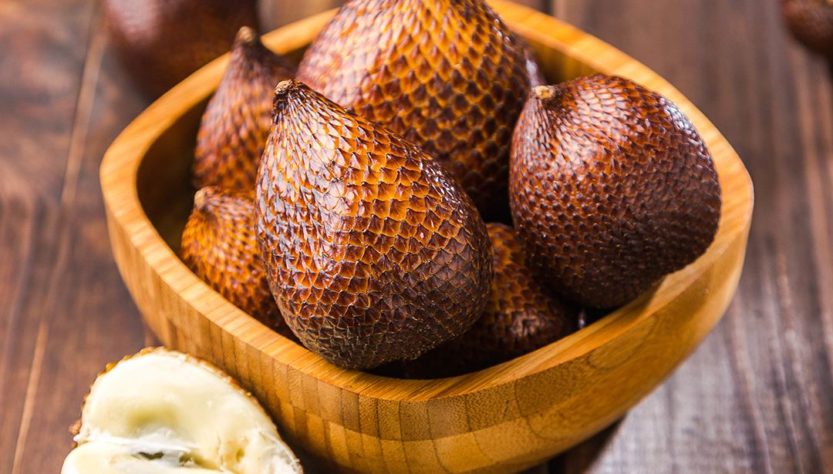Salak is a fruit that is quite popular in Indonesia. This fruit that comes from Sumatra and Java has brown skin and rough scales, so it is also known as snake fruit.
In addition to its delicious taste, which tends to be sweet and sour, it turns out that the benefits of salak for health are also quite diverse. Salak contains calcium, phosphorus, potassium, vitamin A, vitamin B, vitamin C, carbohydrates, protein, iron, and fiber. The content is of course very needed for the body.
Salacca zalacca, also known as salak fruit, is a tropical fruit that is also native to Indonesia. Salak was originally found growing wild in nature in southwestern Java and southern Sumatra. However, the exact origin of the bark is unknown. Over time, salak is then widely cultivated in Thailand, Malaysia and eastern Indonesia to Maluku. Salak has also been introduced to the Philippines, Papua New Guinea, Queensland and Fiji.
Salak is a kind of fruit palm that is in the form of shrubs or almost no thorny trunk, creeps and gives birth to many, grows into a dense and strong clump. Stems spreading below or above the ground, forming rhizomes, often branched, 10-15 cm in diameter.
Types of Salak Based on the cultivar, in Indonesia people recognize between 20 and 30 species under species. Some of the famous include:
1. Salak Sidimpuan from North Sumatra,
2. Salak condet from Jakarta,
3. Salak pondoh from Yogyakarta
4. Balinese Salak from Bali
Nutrition of Salak Fruit Quoted from Panganku.org, the nutritional composition per 100 g of Salak fruit, with an Edible Weight (BDD) of 93%, is as follows:
• Water (Water): 78.0 grams (g).
• Energy (Energy): 77 calories (cal).
• Protein (Protein): 0.4 g.
• Carbohydrates (CHO): 20.9 g.
• Ash (ASH): 0.7 g.
• Calcium (Ca): 28 milligrams (mg).
• Phosphorus (P): 18 mg.
• Iron (Fe): 4.2 mg.
• Copper (Cu): 0.08 mg.
• Zinc (Zn): 0.2 mg.
• Beta-Carotene (Carotenes): 4 micrograms (mcg).
• Total Carotene (Re): 0 mcg.
• Thiamin (Vit. B1) : 0.04 mg.
• Vitamin C (Vit. C): 2 mg
Here are the benefits of salak that you need to know:
1. Supports Eye Health
Salak contains vitamin A which is quite high. As is known, eye health needs to be supported by a good intake of vitamin A. Salak also contains beta-carotene, which is an antioxidant that is needed by the eyes.
2. Maintain Good Endurance
Good body defense is the key so you can move well. The body’s defenses can be in prime condition if they get adequate intake of B vitamins. Meanwhile, salak is one of the fruits that contains abundant B vitamins, you know.
3. Increase Stamina
Salak contains carbohydrates or in other words has a sugar content. However, the type of sugar in salak is a good type of sugar. So, the benefits of salak for health can also increase stamina. Later, carbohydrates from the bark will be converted into glucose. Then, glucose will be converted again into energy.
4. Maintain Heart Health
Salak is known not to contain cholesterol, but contains potassium. Potassium has good benefits for heart health. Not only that, salak also contains antioxidants that can maintain healthy blood vessels.
5. Avoiding the Body from Chronic Diseases
Eating salak fruit can also make the body avoid chronic diseases. Because, salak contains a variety of antioxidants and can inhibit inflammation in the body.
Thus, eating salak can not only reduce the risk of heart disease, but can prevent you from diabetes and stroke. Antioxidants from salak fruit can also prevent the buildup of inflammatory cells.
6. Maintain Pancreas Health
In the bark, there is a content that can regenerate pancreatic cells. A healthy pancreas is needed by diabetics. The reason, diabetics can not produce normal insulin due to decreased function of pancreatic cells.
7. Improve Memory
The benefits of this one salak make it dubbed the fruit of memory. The reason is because salak contains minerals and active ingredients in the form of potassium and pectin. The content of these substances can increase blood flow to the brain, improve cognitive abilities, and strengthen memory.
In addition, the antioxidants in salak fruit also help prevent oxidative stress in the body’s cells. So, eating salak fruit can reduce the risk of developing neurodegenerative diseases.
8. Controls Blood Sugar
As explained above, salak has good benefits for pancreatic health. The pancreas is an organ that plays an important role in producing insulin, so it can help control blood sugar.
In addition, the content of pterostilbene, which is a chemical similar to resveratrol, is considered to be able to protect beta cells in the pancreas and can prevent insulin resistance.
9. Help Lose weight
antioxidants that the body needs.
Carbohydrates can be an additional energy while on a diet. Then, the antioxidant substances are very good at treating cells and inhibiting premature aging. While the fiber can make you feel full longer.
10. Healthy Digestion
The benefits of salak can also nourish the digestive tract because it contains tannins, saponins, and flavonoids. These three substances are high antioxidant compounds that are good for digestion.
Tannins in salak fruit can also act as antidiarrheal which can help cure diarrhea, you know. You are also advised to consume salak with the skin, which can help prevent constipation.
the row of benefits of eating salak fruit for health that you need to know. Interested in trying it? Although scaly like a snake, this fruit has a delicious taste, is easy to get, and easy to eat.
The need for digital IT is needed in daily activities, Bead IT Consultant is the right choice as your partner, visit our website by clicking this link: www.beadgroup.com

